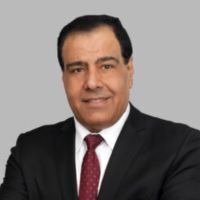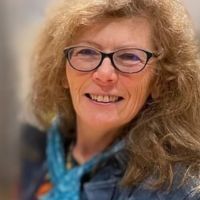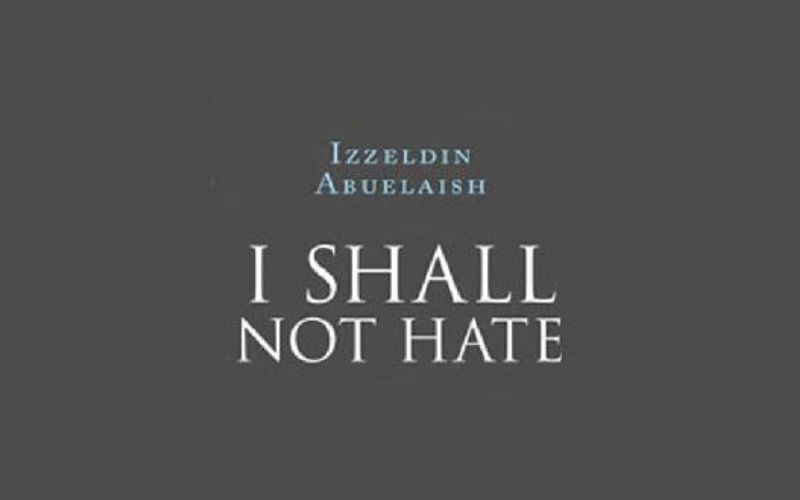by Professor Dr. Izzeldin Abuelaish
Date: Friday, March 8 at 9:30 AM Pacific Time
Check your local times using this date/time converter.
Cost: Suggested donation $10 US.
We will offer this program free to those whose resources are limited.
Watch the Recording of the Program
Book Description
By turns inspiring and heart-breaking, hopeful and horrifying, I Shall Not Hate is Izzeldin Abuelaish's account of an extraordinary life. A Harvard-trained Palestinian doctor who was born and raised in the Jabalia refugee camp in the Gaza Strip and "who has devoted his life to medicine and reconciliation between Israelis and Palestinians" (New York Times), Abuelaish has been crossing the lines in the sand that divide Israelis and Palestinians for most of his life - as a physician who treats patients on both sides of the line, as a humanitarian who sees the need for improved health and education for women as the way forward in the Middle East. And, most recently, as the father whose daughters were killed by Israeli soldiers on January 16, 2009, during Israel's incursion into the Gaza Strip. His response to this tragedy made news and won him humanitarian awards around the world. Instead of seeking revenge or sinking into hatred, Abuelaish called for the people in the region to start talking to each other. His deepest hope is that his daughters will be "the last sacrifice on the road to peace between Palestinians and Israelis."

About the Author Professor Dr. Izzeldin Abuelaish MSC, OOnt, MD, MPH, M. Hon. LLD., Litt D., D. Sc., D.H.L
Prof. Izzeldin Abuelaish is a Palestinian Canadian physician and an internationally recognized human rights and inspirational peace activist devoted to the advancement of girls in the Middle East. He has dedicated his life to using health as a vehicle for peace, and, despite all odds, succeeded, aided by a great determination of spirit, strong faith, and a stalwart belief in hope and family. He is a man who walks the walk and who leads by example.
Prof. Izzeldin Abuelaish was born and raised in Jabalia Refugee Camp in the Gaza Strip. Through his work, he has experienced firsthand the impacts of conflict in countries like Palestine, Egypt, Israel, Uganda, Yemen, Afghanistan, and Saudi Arabia. His experience working as both an insider and outsider to conflict has led him to believe that doctors are particularly well-poised to serve as peacemakers, based on the moral doctrine of their profession. His work as both a healthcare practitioner and a peace advocate build on this philosophy and mobilizes health as a tool for peace. Prof. Abuelaish believes that medicine and health can be an engine for the human peace. Health and medicine are human equalizers, socializers, harmonizers and stabilizers. He continues to advocate for justice, health, peace, and human rights worldwide.
Prof. Abuelaish has overcome many personal hardships, including poverty, violence, and the horrific tragedy of his three daughters’ and niece’s deaths in the 2009 Gaza War. He continues to live up to the description bestowed upon him by an Israeli colleague, as a “magical, secret bridge between Israelis and Palestinians” and in the world. He is now one of the most outspoken, prominent, and beloved researchers, educators and public speakers on peace and development in the Middle East.
Prof. Abuelaish has been nominated five times for the Nobel Peace Prize, and he is fondly known as Nelson Mandela, Mahatma Ghandi and the “Martin Luther King of the Middle East,” having dedicated his life to using health as a vehicle for peace. Despite all odds, he has succeeded remarkably; aided by a great determination of spirit, strong faith, and a stalwart belief in hope and family. The Belgian Parliament named him the “Martin Luther King of the Middle East.” Again in 2016, Mr. Jean Marc Delizee from the Belgian Parliament nominated Dr. Abuelaish for the 2016 Noble Peace Prize and remarked that “Our world has more than ever needed peace ambassadors such as him, of men and women capable of building bridges and links between people and between peoples. Many influential figures within the diplomatic community have spoken exaltingly of Prof. Abuelaish’ work. In his nomination for the Sakharov Prize, Dr. David Naylor, then President of the University of Toronto, called Prof. Abuelaish a remarkable ambassador for peace and an exemplar of forgiveness and reconciliation. The President of the European Parliament, Hans-Gert Pöttering spoke of him in his speech in Strasbourg, France, at the opening of the exhibition “From Hebron to Gaza.” President Barack Obama referred to him as an example of strength and reconciliation in his address on May 19th, 2011, when he discussed the possibility of peace within the Middle East. And the Colombian President Juan Manuel Santos too cited Prof. Abuelaish in his speech Walk for Solidarity: Kindness and forgiveness are not signs of weakness but strength. It needs more courage to be nice and make peace than to be angry and want revenge.
Prof. Abuelaish’ impact on peace-seeking communities is exceptional. He is an internationally renowned speaker, having spoken at the Canadian House of Commons, the American Congress, the Chilean Senate, and Parliament, the European Parliament at Place Du Luxembourg in Brussels, the State Department, Forum 2000 in Prague, and many more. Dr. Abuelaish has also spoken at academic institutions and organizations in Canada, the United States, Europe, Africa, and Australia and Asia.
In addition to speaking to live audiences, Prof. Abuelaish has been interviewed extensively by leading journalists and prominent personalities, including Christiane Amanpour, Anderson Cooper, Sir David Frost and Zeinab Badawi, and has appeared on prominent media outlets such as BBC News Hard Talk, Fox News Channel (FOX), CNN, Al Arabiya News, London’s The Telegraph, ABC, TVO, The Globe and Mail, The Economist, The New York Times, Vanity Fair, the Boston Globe, People Magazine. Prof. Abuelaish’ book, I Shall Not Hate: A Gaza Doctor’s Journey on the Road to Peace and Human Dignity, an autobiography of his loss and transformation, has achieved worldwide critical acclaim. Published in 2010, (currently in 23 different languages), and inspired by the loss of his three daughters –Bessan, Mayar, and Aya – and their cousin Noor to Israeli shelling on January 16th, 2009, the book has become a national and international bestseller. It has also become a testament to his commitment to forgiveness as the solution to conflict and the catalyst towards peace.
Eli Wiesel, Nobel Peace Prize Laureat said about the book I Shall Not Hate: This story is a necessary lesson against hatred and revenge. President Jimmy Carter said: In his book, Dr Abuelaish has expressed a remarkable commitment to forgiveness and reconciliation that describes the foundation for a permanent peace in the Holy Land. The Daily Telegraph: A great work of insight and compassion that tries to point the way towards peace and reconciliation… If there is to be peace in the Middle East, it will come through men and women of the giant stature and epic capacity for forgiveness. Sunday Times: A remarkable study of compassion, and of daily life in the Gaza Strip, Prof. Abuelaish believes that hatred is a chronic, contagious, and destructive disease. He focuses his research to promote awareness about the impact of hatred on health and wellbeing, and how to prevent spread of this destructive disease through positive resilience, tolerance, compassion and reconciliation. Prof. Abuelaish’ extensive list of awards and honors include countless national and international awards including 18 honorary doctorate degrees, The order of Ontario, The Meritorious Service Cross, and the Queen Elizabeth II Diamond Jubilee Medal, The Governor General’s Medallion, The PAHL Peace Prize, the World Citizenship in Action Award, presented by the Canadian Branch of the Registry; the Mahatma Gandhi Peace Award of Canada; the Foundation P&V Citizenship Award; the Calgary Peace Prize; the Lombardy Region Peace Prize, the Stavros Niarchos Prize for Survivorship; Prof. Abuelaish has been named one of the Top 25 Canadian Immigrants; one of the 500 Most Powerful Arabs; and one of the 500 Most Influential Muslims by the Royal Islamic Strategies Centre in Jordan for five consecutive years. He was one of three finalists for the Sakharov Prize for Freedom of Thought.
Prof. Abuelaish has founded Daughters for Life, a Canadian charity, in memory of his daughters and to honor his commitment to women’s empowerment. Daughters for Life that provides young women in high school and university the opportunity to pursue higher education so that they can become strong agents of change and advocates of peace; functions of women’s vital role in improving the quality of life throughout the Middle East and the world at large.
Currently, Prof. Abuelaish lives in Toronto where he is a Full Professor at the Dalla Lana School of Public Health at the University of Toronto. He remains deeply committed to his humanitarian activism in addition to his roles as a charity leader and inspirational educator.

About the Facilitator: Marj Andre
Marj Andre is a community connector. She has the web site and newsletter www.OnRichmondhill.com promoting the events and happening in the Richmond Hill. She is the founder and facilitator of the cross-sector collaborative Connecting the Community, bringing people from diverse backgrounds together for good conversations. In 2022 she launched the Connecting the Community podcast, recording conversations with good people doing good things.
Marj has been active with the Charter for Compassion and has the role of coordinating the compassionate cities in Canada.
She has a degree in sociology from Western University and a Marketing Diploma from Seneca College, and has completed the online Indigenous Canada Course Certificate – University of Alberta
Marj has lived in Richmond Hill for more than 30 years raising five sons. And she loves to photograph nature.

